Throughout 2015 at Broken Frontier we’ve been holding monthly discussions on the current UK self-publishing scene in our regular ‘State of the Small Press Nation’ series of multi-creator discussions and individual guest blogs. It’s been a period of comprehensive and thoughtful debate with the issues raised including reflections on whether the scene is growing quicker than its potential readership, the ever burgeoning number of shows and festivals, higher quality printing opportunities versus DIY culture, and questions surrounding building a greater audience.
Today we reach the end of this first run of ‘Small Press Nation’ pieces with a focus on the difficulties of gaining publicity for work. With a growing number of creators self-publishing, and a relatively limited pool of punters picking up small press books, just how crucial is getting coverage from external sources for your comics? Are there enough available outlets for publicising self-published work? How do you approach spreading the word beyond appearances at shows and festivals? Do creators feel they are working in a vacuum?
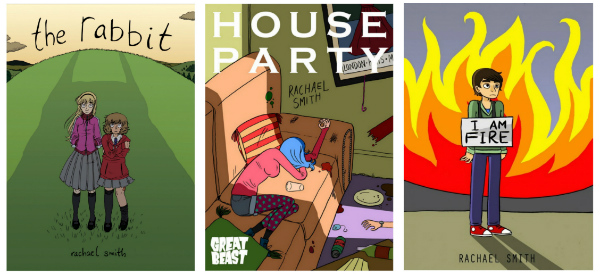 We’ll start with the thoughts of creator Rachael Smith (House Party, I Am Fire and the upcoming The Rabbit from Avery Hill Publishing) who has very specific experience in this area. Smith advises that those entering the self-publishing arena should have a strategic approach. “I used to work in PR and marketing, so publicising my work has always felt like a natural part of the creative process for me. Why put effort into making something if you’re not going to try to get people to look at it? Write press releases when you have something new out, send them to comics journalists and book reviewers. Contact your local radio station. Print promotional leaflets for your book and ask shops (very nicely) if they’ll put them on their counters for you. You just need the confidence to reach out to people, and to be a little methodical about it.”
We’ll start with the thoughts of creator Rachael Smith (House Party, I Am Fire and the upcoming The Rabbit from Avery Hill Publishing) who has very specific experience in this area. Smith advises that those entering the self-publishing arena should have a strategic approach. “I used to work in PR and marketing, so publicising my work has always felt like a natural part of the creative process for me. Why put effort into making something if you’re not going to try to get people to look at it? Write press releases when you have something new out, send them to comics journalists and book reviewers. Contact your local radio station. Print promotional leaflets for your book and ask shops (very nicely) if they’ll put them on their counters for you. You just need the confidence to reach out to people, and to be a little methodical about it.”
Paul Shinn (March of the Penguins, Tempo Lush Tales, self-portrait below) also feels it’s incumbent on creators to manage their own opportunities for promotion. “I would say that in the times we are living in, there is no excuse for creating in a vacuum and the Internet provides multiple outlets for publicising your work. You can be producing the most amazing work in the world, but if nobody knows about it, then what’s the point? (I don’t mean this as a criticism of just creating for the sake of creating, which I wholly approve of, rather it’s a criticism of anyone becrying a lack of promotion for their work. “If you build it, they will come”. Or something.)
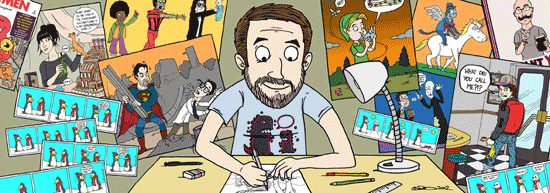 “And that’s without taking into consideration offline means of promotion and publicity. You were asking about the easy availability of cheap high quality printing in a previous article, and that makes printing business cards, postcards, stickers, even branded guitar picks(!) easier than ever. And if that’s still too expensive, then there’s still the D.I.Y. culture, a pen and a piece of paper to fall back on! Publicity is only really limited by your imagination. And if we lacked imagination, we probably wouldn’t be doing this in the first place…”
“And that’s without taking into consideration offline means of promotion and publicity. You were asking about the easy availability of cheap high quality printing in a previous article, and that makes printing business cards, postcards, stickers, even branded guitar picks(!) easier than ever. And if that’s still too expensive, then there’s still the D.I.Y. culture, a pen and a piece of paper to fall back on! Publicity is only really limited by your imagination. And if we lacked imagination, we probably wouldn’t be doing this in the first place…”
David O’Connell (ink + PAPER, Jampires) has similar thoughts on being proactive about getting your work seen by the comics media and also points to the importance of networking. “There are loads of online outlets for publicity – it shouldn’t be an issue if you are prepared to shout about your work (in a nice way, of course). Engaging with other creators and readers is important and something I don’t do enough. Those kind of relationships are vital if you want people to remember you and your work. It all comes down to your own effort in the end and how much you need your audience to validate what you do.”
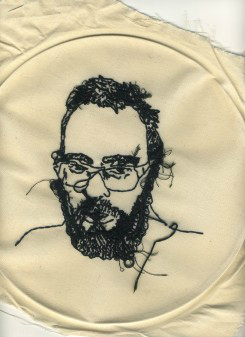 One of those creators who was at the forefront of the new wave of UK self-publishing, Gareth Brookes (The Black Project, The Land of My Heart Chokes on Its Abundance, embroidered self-portrait right) reflects on both the practicalities of pushing your work and the massive potential audience outside of the traditionally perceived comics readership. “I’m very lucky and right now I get lots of publicity, but I made small press comics for years and yes, it sometimes felt as if I was creating in a vacuum, particularly as back in 2006-7 there were few opportunities to exhibit and no opportunities to get published.
One of those creators who was at the forefront of the new wave of UK self-publishing, Gareth Brookes (The Black Project, The Land of My Heart Chokes on Its Abundance, embroidered self-portrait right) reflects on both the practicalities of pushing your work and the massive potential audience outside of the traditionally perceived comics readership. “I’m very lucky and right now I get lots of publicity, but I made small press comics for years and yes, it sometimes felt as if I was creating in a vacuum, particularly as back in 2006-7 there were few opportunities to exhibit and no opportunities to get published.
“What happened was that creators made their own opportunities. Groups like the LUC, Alternative Press, LACAF, Bristol/Birmingham Comic & Zine Fair sold comics in markets, pubs and community centres. Anthologies like The Comix Reader and Paper Science went to festivals. I sold nearly 500 copies of The Comix Reader at a festival one year, and the phrase I kept hearing was ‘I haven’t read a comic for years’. Opportunities like that are only an e-mail away. There are masses of potential comics fans out there.
“If you feel like the audience is squeezed then take the initiative and try and expand it.”
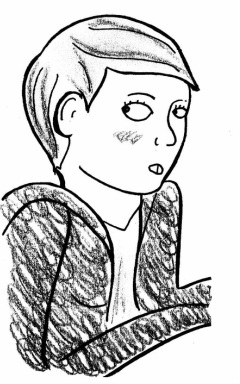 Team Girl Comic stalwart Gill Hatcher (The Beginners Guide to Being Outside, The Seagull Appreciation Society, self-portrait left) also underscores the fundamental importance of looking beyond a confined demographic of enthusiasts and taking comics into other arenas but is pragmatic about the challenges faced. “I think compared to some others I do ok publicity-wise, although I find it very difficult to sell myself and have to force myself to do it. I’m fortunate that Team Girl Comic has taken off and it’s the kind of thing people are interested in writing about (feminist blogs etc.). I get some publicity for my own work off the back of this but not much, and I’m not sure how much of it actually translates into sales. Also, I’m fortunate that I don’t mind speaking in public so I get invited to do talks at events and universities which helps publicise my work.
Team Girl Comic stalwart Gill Hatcher (The Beginners Guide to Being Outside, The Seagull Appreciation Society, self-portrait left) also underscores the fundamental importance of looking beyond a confined demographic of enthusiasts and taking comics into other arenas but is pragmatic about the challenges faced. “I think compared to some others I do ok publicity-wise, although I find it very difficult to sell myself and have to force myself to do it. I’m fortunate that Team Girl Comic has taken off and it’s the kind of thing people are interested in writing about (feminist blogs etc.). I get some publicity for my own work off the back of this but not much, and I’m not sure how much of it actually translates into sales. Also, I’m fortunate that I don’t mind speaking in public so I get invited to do talks at events and universities which helps publicise my work.
“It’s difficult to get publicity outside the comic sphere. I’ve tried contacting literary websites, newspapers, wildlife magazines, etc., in the past and there’s very little interest in comics. Because of my wildlife niche, I can sometimes get a little bit of publicity on social media by aligning my work with conservation campaigns. But again, I’m not sure how much of this actually results in sales.”
Cliodhna Ztoical (Sorry I Can’t Take Your Call at the Moment but I’m Off Saving the World) has touched on this issue of pushing comics to related but non-traditional demographics before (here) in these ‘State of the Small Press Nation articles. She states “Publicity is always an issue but like the online store there are ways to really push but it totally depends on how much work you want to put in. Publicity for me depends on what I’m looking to promote. Smaller comics/art books I usually rely on social media while larger comics/anthologies I would put a press release together and contact review sites/comic sites. If I think it has an audience outside of comics I would get in touch with publications/sites associated with that interest.”
Of course, when you’re self-publishing as a sideline or hobby, then publicising and promoting your own work to a significant degree may not be a possibility. Time is a commodity and a resource in its own right, as Mickey Lam (Mr. Yang Fights Aliens, pictured below) underlines: “I’d say publicity is an issue for most small pressers. It comes down to time for me. I’m working on a new comic and I dislike projects that drag on, so I try complete them as quickly as possible. This means I spend most of my available time drawing, so marketing and promoting become less of a priority.
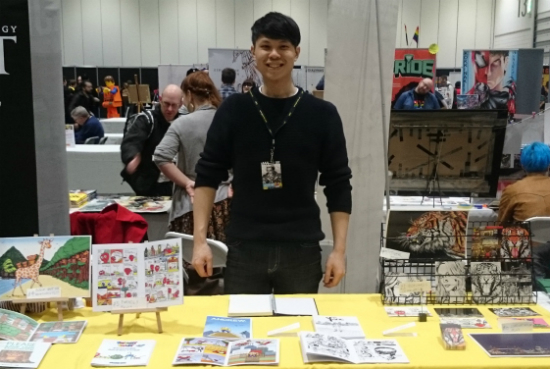 “In terms of available outlets, there are plenty. For social media, you can use tumblr, instagram and pinterest to showcase your work. You can blog your own work, or ask for an early review by comic book websites before launching your book. I’d like more review websites for indie stuff however.
“In terms of available outlets, there are plenty. For social media, you can use tumblr, instagram and pinterest to showcase your work. You can blog your own work, or ask for an early review by comic book websites before launching your book. I’d like more review websites for indie stuff however.
“Physically, in London, there are a few comic book shops that will stock your book such as Orbital and Gosh! All of these together will increase your chance of being discovered by someone. Every comic book is someone’s first.”
The viability of large scale self-promotion is also mentioned by Chris Kent (Flood, The Golem). “I always create from, and within, my own little world. Publicity is important but I choose not to spend much money on publicity. Rather I look at getting reviews and articles about my work, then promoting these through social media. I believe that when I take my work to new shops – comic shops, book shops, galleries, workshops and take my work to comic book events in-person – I find the best method of publicity to be firsthand promotion. Because I have other aspects of my creative work sometimes I have to prioritise my time and energy according to which project is most cost effective.”

Recent Avery Hill Publishing releases including Abe Christie’s Swear Jar, Tillie Walden’s The End of Summer, and Elizabeth Querstret’s Walks with LuLu
In the world of micropublishing there’s a responsibility, of course, not just to push work for your own sake but also to promote the creators you represent. David White of Avery Hill Publishing has these words on shops, review sites and social media in regards to publicity. “We’re constantly looking for ways to get us and our creators noticed, and that’s a big challenge which takes up a lot of our time. And it must be an even bigger challenge for creators self-publishing in relative isolation. Creating the work is hard enough, then you’ve got to promote it as well. It’s not impossible, but it’s tough.
“First up, there aren’t enough dedicated comics shops willing to work with self and independent publishers on terms that work for the people putting the work out. That’s not necessarily a criticism of comics shops that don’t stock independently produced work, or if they do, treat them the same as a major publishing house (sale or return terms, only dealing with distributors, and so on) – they’ve got to make their business work in the best way they see fit. But at the same time, shops like Gosh!, Orbital and Page 45 are a treasured rarity. The support they provide is incredible, and from what I understand they make a success of it, so it shows it can work.
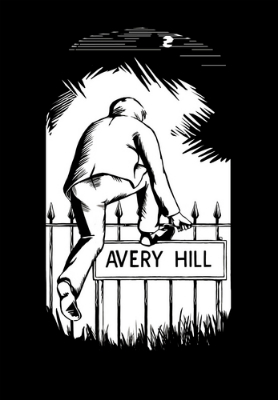 “Websites that support and champion independent work are an equally treasured rarity. It’s almost at the point where you can count on one hand the websites that genuinely provide that support in the UK, and can also connect with a decent-sized audience. The work they do is immensely appreciated, but it would be great if there were more of them. And it’s possible they face the same challenge as those putting the work out – how to widen their audience beyond what already exists.
“Websites that support and champion independent work are an equally treasured rarity. It’s almost at the point where you can count on one hand the websites that genuinely provide that support in the UK, and can also connect with a decent-sized audience. The work they do is immensely appreciated, but it would be great if there were more of them. And it’s possible they face the same challenge as those putting the work out – how to widen their audience beyond what already exists.
“I’m not sure it’s worth mentioning the wider, national media – you get the occasional isolated, dedicated voice, but nothing consistent or sustained. And it feels like we’re still a way off that being any different, certainly at the smaller press level.
“And beyond that, you’ve got social media, which is as much a gift as a curse. It still provides that unique opportunity to communicate directly with your potential audience with a frequency and immediacy that’s unparalleled, but it’s a jungle out there. I’ve given up keeping track of the life expectancy of a Tweet, if it’s even a real thing, and everyone is doing the same thing, all the time. It’s more or less impossible to stand out in a really positive way (far easier to stand out in a really negative way…), but those benefits just can’t be missed. It’s like wading through treacle, but you’ve got to keep moving.
“In summary (which is what you asked for in the first place, sorry), you’ve got to be loud, proud, and mindful of your audience, all in a positive way – all far easier said than done, but it’s a rare case that generates success without making your own publicity.”
Accent UK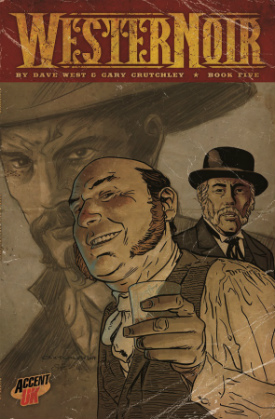 are a smaller genre fiction-focused publisher sitting between self-publishing and the larger publishers. It’s a precarious position in terms of getting the oxygen of publicity according to their Colin Mathieson. “The middle ground between mainstream and small press can be a lonely place! We’re too big for some and too little for others which means, despite our longevity, growing readership and European successes, other than reviews of our books, we generally struggle for publicity or recognition. This may well be self-inflicted though as we’ve never been ones for regular press releases so this is definitely an area that we can and should improve on.
are a smaller genre fiction-focused publisher sitting between self-publishing and the larger publishers. It’s a precarious position in terms of getting the oxygen of publicity according to their Colin Mathieson. “The middle ground between mainstream and small press can be a lonely place! We’re too big for some and too little for others which means, despite our longevity, growing readership and European successes, other than reviews of our books, we generally struggle for publicity or recognition. This may well be self-inflicted though as we’ve never been ones for regular press releases so this is definitely an area that we can and should improve on.
“Being older, I really miss the likes of Comics International or Barry Renshaw’s Red Eye magazine (which we initially published!) for an accessible and objective overview of the indie market and I really think that there is an opportunity for someone out there to produce something similar at a low price point to sell/distribute at shows to complement the strong indie comics online presence.”
Having dedicated staff dealing with publicity is beyond many within the small press world but for Soaring Penguin Press it has been invaluable. Publisher John Anderson explains: “I have a Press Officer working on a part-time basis. One of the best decisions I’ve ever made. (The third best, after marrying my wife and hiring Nora [Goldberg]). Publicity is always an issue. How do the general public learn about a book if they can’t otherwise hear about it? Oh, we use Twitter and Facebook, we send out galleys and press releases and samplers. But having someone who actually knows who to talk to and how to pitch a press release so that it catches someone’s attention is invaluable. Regardless, publicising a book is a tough job.”
P.M. Buchan (La Belle Dame Sans Merci, Love Will Tear Us Apart, Blackout) highlights the importance of review sites in spreading the word. “Publicity is an issue for everybody. There’s no point creating the work if you’re not going to make the world aware of it. One of my favourite comic creators broke my heart when she told me that a friend had advised her not to send out a press release to announce the launch of her self-published graphic novel, because people would be sick of hearing about it. Hearing that was like a punch in the gut. We all need to do more to publicise our work.
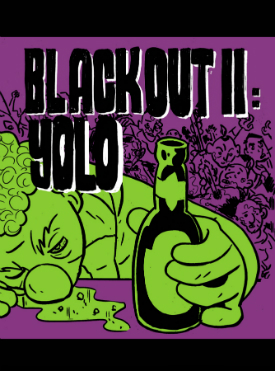 “The people that write about independent comics in the UK are brilliant, but there isn’t enough reward for it. I had to quit reviewing comics more-or-less because there just wasn’t enough incentive to continue keeping abreast of everything that was being published, and there’s no point in becoming a critic if you can’t review a work within a wider context. I advise everybody to support the best reviewers, tell them how much their work is valued, share what they do, because without them you’ll sink like a stone.”
“The people that write about independent comics in the UK are brilliant, but there isn’t enough reward for it. I had to quit reviewing comics more-or-less because there just wasn’t enough incentive to continue keeping abreast of everything that was being published, and there’s no point in becoming a critic if you can’t review a work within a wider context. I advise everybody to support the best reviewers, tell them how much their work is valued, share what they do, because without them you’ll sink like a stone.”
For Craig Collins (Crawl Hole, Metrodome) it’s less about a lack of outlets for publicity and more about how you stand out from the crowd: “Everything is abuzz with promotion at all times so it can be easy to be lost in the Twitterstorm, both as a reader and a creator. But that’s not a vacuum, in fact social media is probably the opposite so it’s more a case of getting people interested in your work despite that abundance of other things they could be reading. For my part there are enough outlets to reach out to and make a decent go of publicity, though I feel having good connections with the people involved in running these can be a factor in how well that goes.”
Not everyone finds generating publicity to be an easy option however. Donya Todd (Bimba and the upcoming Buttertubs from Avery Hill) says “I find marketing super hard to manage and predict. Likes and shares on various platforms are great for spreading the word, networking and finding out about new events. However likes and shares don’t always mean sales so you’re always having to figure out what works. It’s great having blogs like Broken Frontier, Comics & Cola and Forbidden Planet championing artists’ work but it can be difficult knowing how to publicise your own work without it feeling like spam/begging.”
Rozi Hathaway (The Red Road) – one of this column’s ‘Six UK Small Press Creators to Watch in 2015’ – has found it a similar uphill struggle and also points to the importance of getting those all-important reviews. “Gaining publicity is hard, I consider myself quite lucky so far with the assistance of Broken Frontier, though gaining sales was still no walk in the park even with the help. A lot of it, for me, is about a strong internet presence, but it tends to feel like I’m talking to myself half the time anyway. I just keep on and on until something gets seen, which happens eventually. Trying to get reviewed has been the biggest issue for me so far, as that’s definitely key in gaining exposure.”
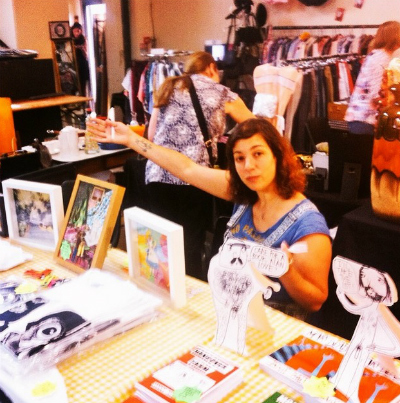 Was it… Too Much for You? and Hangover Farm creator Danny Noble (another of my ‘Six to Watch’, pictured right) can always be relied on for a distinctly Noble perspective on any self-publishing issue. “Publicity is an issue for me in so much as I’m the type of person who would rather pull out her own spleen and bounce it on the dusty floor than shout about how great I am. But it seems almost insulting to those who have given me such brilliant support recently to not capitalise on their help. So what I really need to do is GET A GRIP. Not sure if it’s a gender problem or a Danny problem, but I have a poster in my room that yells WOMEN DON’T BE MODEST in loud bold colours just in case. It’s been easier with my most recent book (Was it…Too Much for You?) as I see [central characters] Ollie and Alan as two wild and willful offspring rather than Work What I Made.
Was it… Too Much for You? and Hangover Farm creator Danny Noble (another of my ‘Six to Watch’, pictured right) can always be relied on for a distinctly Noble perspective on any self-publishing issue. “Publicity is an issue for me in so much as I’m the type of person who would rather pull out her own spleen and bounce it on the dusty floor than shout about how great I am. But it seems almost insulting to those who have given me such brilliant support recently to not capitalise on their help. So what I really need to do is GET A GRIP. Not sure if it’s a gender problem or a Danny problem, but I have a poster in my room that yells WOMEN DON’T BE MODEST in loud bold colours just in case. It’s been easier with my most recent book (Was it…Too Much for You?) as I see [central characters] Ollie and Alan as two wild and willful offspring rather than Work What I Made.
“I definitely don’t feel like I’m working in vacuum, especially with the kind, welcoming folk you stumble across in the small press world. Though there seems to be plenty of outlets for publicising work, especially in the free world of social media I do sometimes wonder if it’s reaching the same few bewildered people over and over, or getting lost in the wall of sound that is creative types spamming their work.
“But that is what I’m engaged in at the moment. On Facebook, on Instagram, and mostly on Twitter. Small pills of spam hidden among the ice-cream of clowning around.
“Too many metaphors? Ah well…”
The gulf between the act of creation and the act of promotion is mentioned by Richy K. Chandler (Tempo Lush Tales, Lucy the Octopus). “I’d like to imagine I would still create comics even if nobody wanted to read them. That being said having people read my work definitely breathes life into the process. Wanting to make comics is natural to me whereas publicising them feels like a far more alien task so any sites, podcasts and publications that make it easier are immensely appreciated.”
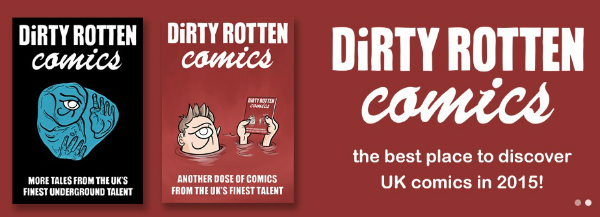 Gary Clap, is co-editor of Dirty Rotten Comics, an inclusive anthology that actively seeks to publicise the work of creators of all levels of technical ability. “This is a great question. To put it simply, I don’t think there’s nearly enough exposure relative to the amount of work that’s getting produced in the UK at the minute. If we’re talking purely in terms of online news/review sites and podcasts it’s very difficult knowing how much of an audience actually exists for this type of content. Outside of those avenues, it’s hard to know how we should create new forums for exposure. Of course, it’s up to us as creators and consumers to create these avenues; if we want the outside world to take us seriously, then we have to be creative and vocal in pushing what we’re doing.”
Gary Clap, is co-editor of Dirty Rotten Comics, an inclusive anthology that actively seeks to publicise the work of creators of all levels of technical ability. “This is a great question. To put it simply, I don’t think there’s nearly enough exposure relative to the amount of work that’s getting produced in the UK at the minute. If we’re talking purely in terms of online news/review sites and podcasts it’s very difficult knowing how much of an audience actually exists for this type of content. Outside of those avenues, it’s hard to know how we should create new forums for exposure. Of course, it’s up to us as creators and consumers to create these avenues; if we want the outside world to take us seriously, then we have to be creative and vocal in pushing what we’re doing.”
Kirk Campbell is the other half of the Dirty Rotten Comics team. “Once again, I feel finance is the significant issue here. With the organisers of larger cons pricing many creators out of exhibiting and comic shop chains pushing small press publishing the fringes of their business model, many have to resort to social networking such as Twitter as their sole method of publicising their work. Creators are being squeezed into a small number of free alternatives. The number of voices speaking over each other in an arena such as this can lead to individuals feeling like they are shouting in a vacuum, which will inevitably cause so many writers and artists to give up producing work altogether. Dirty Rotten Comics is our small attempt at giving a voice to those amazingly talented individuals that are facing this issue.”
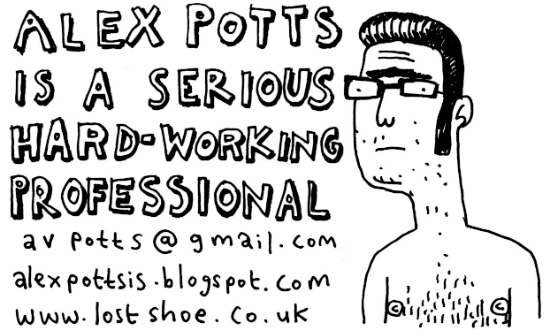 Both Alex Potts (A Quiet Disaster, self-portrait above) and David Robertson (David Robertson’s Dump) feel a sense of isolation to their practice. Potts says “I absolutely feel like I am working in a vacuum. I am rubblish at publicising my own work. I like it better when someone else does that bit. I think that having an online presence is important, and that sending stuff to anthologies is a good way of getting your work out there” while Robertson believes in the importance of grasping opportunities to interact with a broader comics community, “One does create in a vacuum. Getting it out to people is a separate issue, and one I’m learning about all the time. It’s important to get involved with things that come along (such as this article!).”
Both Alex Potts (A Quiet Disaster, self-portrait above) and David Robertson (David Robertson’s Dump) feel a sense of isolation to their practice. Potts says “I absolutely feel like I am working in a vacuum. I am rubblish at publicising my own work. I like it better when someone else does that bit. I think that having an online presence is important, and that sending stuff to anthologies is a good way of getting your work out there” while Robertson believes in the importance of grasping opportunities to interact with a broader comics community, “One does create in a vacuum. Getting it out to people is a separate issue, and one I’m learning about all the time. It’s important to get involved with things that come along (such as this article!).”
And as we reach the end (for the moment anyway) of this series of articles some concluding fitting and sage words from Martin Eden (Spandex) on the reasons for being involved in self-publishing in the first place.
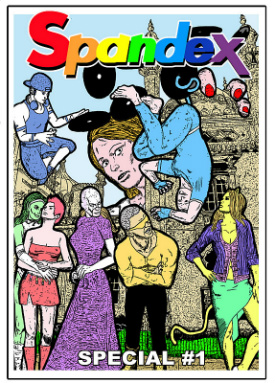 “On a final note I want to say one thing. At last year’s Thought Bubble, I lost count of the fellow small pressers who asked me how sales were or how much money I made. The thing is, this is mainly a hobby for me, so sales aren’t really the be-all and end-all. It’s important not to lose too much money though.
“On a final note I want to say one thing. At last year’s Thought Bubble, I lost count of the fellow small pressers who asked me how sales were or how much money I made. The thing is, this is mainly a hobby for me, so sales aren’t really the be-all and end-all. It’s important not to lose too much money though.
“But it makes me wonder how many other small pressers see this as a job or a hobby. I wonder if people have lost sight of why they’re doing this. I did well at Thought Bubble as my boyfriend is a sales dynamo, but sales don’t really bother me either way (and don’t forget you can have good shows and you can have terrible shows – there are no rules, rhymes or reasons). On a personal level, I chatted to so many new people, regular readers and old friends, and this was my favourite aspect. I’d rather connect with one excited new reader than sell dozens of comics to people who aren’t really that bothered.”
In an ever expanding creative arena – where the opportunities to get one’s work out there and noticed have never been greater – have we somehow lost touch with the core philosophy and values of self-publishing and DIY culture? Perhaps that’s something to consider when we return to discussing the ‘State of the Small Press Nation’ later in the year…
Read all previous entries in the ‘State of the Small Press Nation’ series here.
You can also read my column on ‘How *Do* I Get Coverage for My Self-Published Comic?’ here.
For regular updates on all things small press follow Andy Oliver on Twitter here.







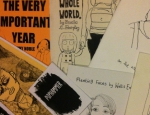

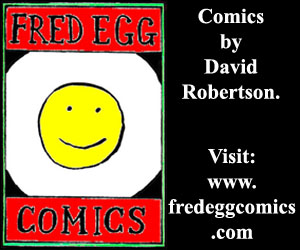





Andy, your ‘State of the Small Press Nation’ Series has been super interesting, informative and witty. Big thanks to you and all your contributors. Roll on next year…
Great post, as ever I do my best to promote independent British comics and creators on downthetubes.net with the help of Tony Esmond, Jeremy Briggs, Colin Noble and others. I wrote this item on writing press releases a while back which may be helpful – http://downthetubes.net/?p=12555. So often I get queries about whether we’ll review a comic without any info or even a cover. I’d advise assuming we will and if not, we can at least plug its release (time permitting) armed with the right information. Also, don’t assume that because you have a Facebook page folk are going to look at it after they’ve liked it (unless hopefully, it’s because they’re one of your ‘core’ fans. Facebook is a bit of a walled garden and I often see people commenting on a link without reading the article or following that link through where the poster would like them to be (i.e. buying your book!)
This is a fantastic read and I look forward to future editions. There truly is some fantastic material out there in the world of the Indies.
Hello Mr Oliver
I’ve been reading thses articles with interest and am pleased that there’s SOMEONE willing to engage in a debate/overview of what passes for the Small Press “scene”(for want of a better word) Having been someone who made zines in the 80s/90s and has returned to doing so again in the last 6/7 years, I can see parallels in the enviroment of the small press then and now., with the same debates rearing their mewling heads. Certainly my experience in returning was initially through Handmade and Bound, which then led to The Alternative Press gang, who I think deserve huge (largely unsung) credit in creating an enviroment which gave a platform for a huge number of creators to find a voice and space in which to feel empowered in simply seeing the possibilities of being creative. I think what’s maybe lacking is enough voices willing to engage in some intelligent discourse about just what is being made, and the reasons why, which a few people you’ve interviewed have touched upon. As in the 80’s, a sudden surge of creativity outside of the mainstream of comics was suddenly noticable, and if you like, went overground. The difference now is the plethora of means of communication which affords anyone an audience if they know how to manipulate it. I think moreoften it’s about developing your audience’s understanding of the medium and for me, the only way to do that is to talk to them (unfortunately for them !) and hopefully create something that makes them want to come back to you and ask questions. I think there’s more requirement not for publicity as such, but more for intelligent and critical discourse. There are far too few people writing about small press zines and comics, in relation to the amount of work out there. Is this because no one knows how to ? Is it because there isn’t enough good work worth writing about?(I doubt that one, I can think of at least twenty people I would happily enthuse in print about and I have done so via zine reviews on comicbitsonline). There are currently huge questions and debates to be had still about the “State of the Press” as it is, and perhaps, if someone’s willing to chair it, some kind of forum might be the answer. This, at least, is a welcome starting point, thank you.
Howdy, just promoting my book:
Pet Planet
On this dystopian fantasy, cattle fight for cattle rights, but people really love hamburgers. Can politics or self dignity give them hope for the future?
Trailer https://vimeo.com/140111968
For online reading at http://RioTesa.com
Cheers !